When you are planning or growing a business, taking the time to read a book may seem too time-consuming. But this is one of those activities that comes with a high ROI, so long as you are reading value-packed works. Below is a list of business books for startups that will provide a high knowledge return in exchange for your highly valued time.
Think and Grow Rich
By: Napolean Hill
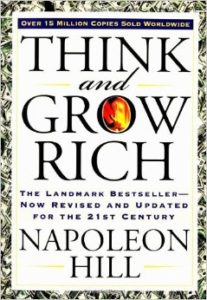
Published in 1937, this is the best selling business book of all time. Part of the draw is his clearly outlined 13 rules for thinking and growing rich which, for the most part, seem like universal truths in any era. But be warned – you will run into ideas that seem utterly laughable today such as Hill’s claim that America offers “freedom through equal opportunity to all races” (in 1937!) or theorizes that male baldness comes from a fear of going bald and hats that are worn too tightly. And success rule #10 which focuses on “sex transmutation”, the art of turning sexual desire into productive action, was probably written shortly after reading one of Freud’s best sellers from the decade. But to assume Hill is out to (a three martini) lunch because of a few missed marks would be to overlook a lot of wisdom. This book provides very insightful perspective shifts and clear steps for anyone who is unhappy with what is and wants to make a change.
The Power of Full Engagement
By: Schwartz and Loehr
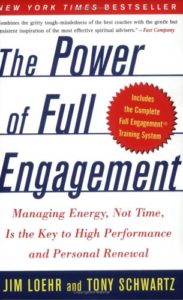
Most books on “performance” tend to focus on prioritizing to-do lists and time management. In The Power of Full Engagement, the authors take a radical approach to performance suggesting that managing one’s energy is the single most important element in becoming more productive and happier in the process. They flip the commonly accepted platitude “it’s a marathon, not a sprint” on its head, suggesting that those who do best (in athletics in particular, but life in general) actually sprint, then recover, then sprint again. Their argument is compelling – without downtime, our uninterrupted performance diminishes and we don’t get the benefit of recovery, where other important things happen; think going to sleep with worry and waking up refreshed or taking a day off from the gym after a hard workout. These recovery spaces make us stronger and prepare us for the next round of challenge. The book follows several clients who are accomplished but run down professionals and business owners seeking to be more productive. Their transformations, achieved primarily through energy management, will offer hope to anyone who feels they are working incessantly, but aren’t accomplishing enough.
The Dip
By: Seth Godin
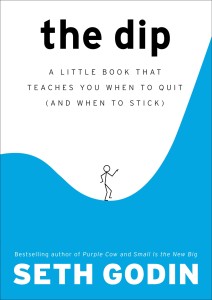
A short read, and worth every minute, this book primes the aspiring entrepreneur for what’s in store. At its heart is the idea that starting a business is exciting and fun but growing a business can be painful (the dip). Sometimes the pain is a sign to stop and other times, it’s part of the process of becoming successful. Godin shows you how to differentiate between the two and has some inspiring word around both the prospect of quitting and pushing forward. At the end of this book, you will lament the fact that you didn’t read it at age 15; you could have avoided all those violin lessons that ultimately got you nowhere and really stuck with piano until you got good, making you the life of any party (where there was a piano) for years to come.
Eat That Frog
By: Brian Tracy
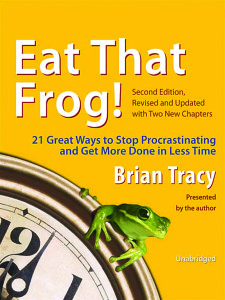
This is considered a bible of time management and the reputation is well earned. A superb guide for those just looking to make more time in their lives and achieve specific goals to business people juggling multiple roles with extraordinary ambitions, this book provides step-by-step instructions on how to prioritize tasks, set goals, and plan accordingly.
Good to Great
By: James Collins
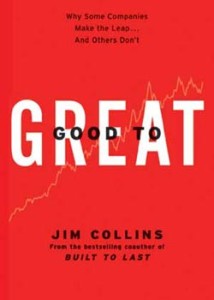
By examining long established large business that went from being good companies to great ones, the authors wanted to discover a formula for making this transformation. The findings will be of interest not only to those looking to improve an existing business, but to those looking to launch a company that is great from the start. Discoveries, such as “getting the right people on the bus” and then devising a course of action, confronting unpleasant realities head-on, and understanding that progress is slow and prodding but becomes exponential, are not complicated ideas. But the stories of business survival or failure illustrated by the adherence to, or disregard for, these approaches make it worth the quick read.
Influence
By: Robert Cialdini
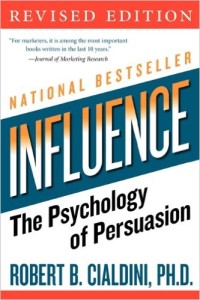
Do you know why you decided to donate to that charity or buy that new kind of coffee? How about who you trust or how you chose your profession over another one? You may think you these choices were very calculated and done with eyes wide open, but science has proven that sometimes disturbingly irrational tendencies lie behind our choices. In speaking with many “compliance professionals” (a.k.a. very good sales people) and pouring over human behavior studies, Cialdini methodically exposes all the unconscious processes that go on while you think you are making a fully informed choice. Want to know why TV executives decide to add laugh tracks to sit coms even though they are fully aware people hate them? Cialdini knows. How about the reason that traffic fatalities skyrocket after a widely publicized suicide? Cialdini knows. The reality is most of us make decisions unconsciously. And the more you, as a business owner are aware of what motivates people, the better you are to (ethically!) press those buttons. After reading this book, you will feel as if you have acquired the superpower of mindreader which will profoundly shape any marketing (and negotiation, customer service, HR, etc.) efforts you undertake.
The Four Hour Work Week
By: Tim Ferris
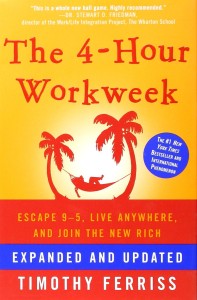
At times this book may compel the reader, if a moral and conscientious person, to throw it at the wall. And at other times, this same reader may finish a passage and drop the book to the floor, in awe of the obvious, yet deeply life improving, perspective shifts that it offers. Tim Ferris, possibly the grandfather of the “life hack” (shortcuts to an easier life), lets you know right in the title, that he has little patience for, well, anything. He thoroughly rejects the notion of working your way up the ladder in life, preferring to find the secret elevator for a relaxing ride to the top. This can manifest in what some might consider unethical behavior such as harassing a professor endlessly after getting a bad grade to condition them not to do this to you again. Or, when aiming to become a gold medal winning Chinese kickboxer,figure out how to exploit the rules about disqualifying your opponent to win by default rather than just practicing the sport to gain mastery. However, Tim is not without wisdom, which is why he’s on this relatively short list of business books. With his F*%# it attitude, he’s able to see the cultural and economic common wisdom from an angle that casts serious doubts on customs most of us have unconsciously accepted. His appeal to take “mini-retirements” rather than saving it all for the end of life when health may be compromised and time short, is something we all should consider. And for the aspiring entrepreneur, Tim offers a view of business ownership as a means to a more fulfilling life, not just a transfer of long, taxing hours as an office worker to long taxing hours as a business owner. His relentless efficiency in business with the sole aim of creating time for self is both logical and compelling. His tips to help you get there are (mostly) insightful and applicable. For those who are miserable and looking to entrepreneurship for a better life, Tim has been there and he wants to help.
Not-Business-Books that are great business reads
Outliers
By: Malcolm Gladwell
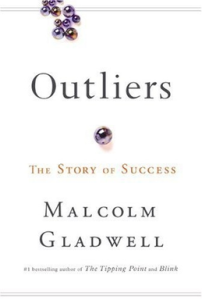
Here Malcolm Gladwell introduces the notion of 10,000 hours, the time it takes to become masterful at something (anything?). He traces the history of the Beatles and Bill Gates among others, discovering that they all put in a lot of hours to become the esteemed figures we know today. There was lots of pushback against Gladwell’s theory – it flew in the face of the deeply revered American narrative of the talented person who is discovered or, through sheer force of will, makes their way to greatness. But Gladwell’s evidence, combined with some critical thinking about human abilities and trajectories, overwhelm the romantic notions of the Horatio Alger allegory. And this is good news! It means hard work, not natural born talent, can triumph. So long as there’s focus, determination and perseverance, we all have the capacity to achieve great things.
Tiger Mom
By: Amy Chua
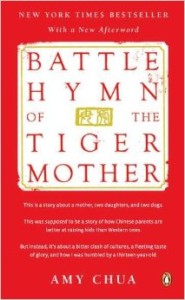
Amy Chua, Chinese mother of two daughters, posits that the American tradition of trying to impart self esteem through affirmations and trophies for everyone gets it all wrong. Her theory, as learned from her Chinese parents/culture, is that a sense of confidence can only come from a sense of competence and competence has to be earned through hard work and mastery. As we watch her (sometime cringe worthy) tough parenting, the high standards that she has for her daughters and her faith that her daughters can do great things if they put in the effort, sets the bar. Yes, some of it may have been a little much (which Chua herself acknowledges in some self-deprecating moments) but the idea of setting a high standard for oneself and putting in the work to get there should be a roadmap to all those who want to become more competent and ultimately more confident in the process.
The Life-Changing Magic of Tidying up
By: Marie Kondo
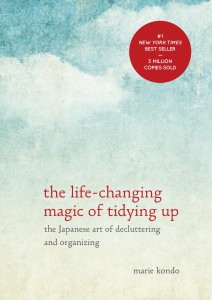
This book was all the rage in 2015, not only for organizing fanatics but for everyday people worldwide. And while organizing wouldn’t seem to have much to do with entrepreneurship, its pages are packed with perspective shifts and concrete tips that can put business productivity into overdrive. The obvious application here is the idea of getting rid of clutter; entrepreneurs have myriad to-do lists so the tidier the space, the easier it is to think clearly, prioritize work and actually get the job done. If your office is a mess, your business probably will be too. This alone makes it absolutely worth the read. But her suggestions for tidying have unexpected insights into all types of projects to be tackled. She advises against the slow and steady approach to organizing, arguing that we tend to accumulate stuff at the same or an even faster rate that we discard things. When we tidy a drawer a week but bring in 10 new items of clothing a month, it gives us a sense of running in place. “If you put your house in order in one fell swoop, you will have tidied up in one fell swoop. (In Japanese, the term is ikki ni, or ‘in one go.’)” For those who have started and run business, the importance of this action/momentum loop is well known. “Don’t let your family see” is another gem of a chapter that can be applied to any aspiring entrepreneur. They mean well (sort of/sometimes) but in most cases, their advice and concern about the choices you are making will probably slow you down if not stop you entirely. As an entrepreneur, there are many unknowns and much will be out of your control. So find some footing in the things that you can control and do it well; Konmarie will show you how.
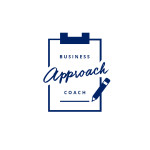
The Business Approach Coach Blog has weekly posts with tips for entrepreneurs who want to know more about the business of creating and running a business. Just pay a visit or subscribe to receive each new post.